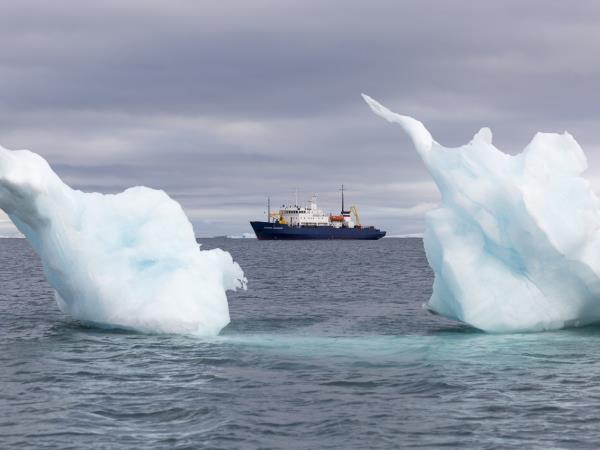
Northern Sea Route Being Redefined So Russia Can Appear to Meet Putin’s Projections
Publication: Eurasia Daily Monitor Volume: 16 Issue: 6
By:

President Vladimir Putin has made Russian development and control of the Northern Sea Route (NSR) one of his top priorities. In his remarks on this topic, Putin has regularly projected enormous growth in the transit of cargo along the NSR on Russian ships in the coming years. But Russian officials doubt that those numbers are achievable; and in order to make it appear that Putin’s lauded maritime east-west passage in the Arctic is successful, they are redefining it. Specifically, even certain cargo carried beyond the existing route in both Europe and Asia will now be counted toward meeting the goals the Kremlin has set. But by doing so, Moscow has only compounded the bureaucratic confusion about who will make decisions about the NSR in the future—or whether any decisions can be made by one agency that will not be undercut by others.
The bureaucratic sleight of hand of meeting Putin’s projections by changing definitions explains both Prime Minister Dmitry Medvedev’s recent proposal and the Kremlin leader’s subsequent acceptance of the idea that there should not be a new ministry for Arctic affairs to oversee the Northern Sea Route, as had long been rumored. Instead, the consensus in Moscow is now that the passage should be managed by a deputy head of the existing Ministry for the Development of the Far East, which will be renamed the Ministry for the Development of the Far East and the Arctic. Yet, that arrangement is not without problems, because it would extend the reach of that heretofore eastern-focused administrative body across northern Russia all the way to Scandinavia (Kremlin.ru, January 18, 2019; Sobkorr.org, January 21, 2019).
Last week (January 16), the RBC news agency reported Moscow officials had concluded that Putin’s projections for the Northern Sea Route, especially if Russia alone controls it, are overly optimistic, in some cases by a factor of more than two. Apparently, these same officials had, therefore, begun to search for a clever way to report that they had met the Kremlin leader’s goals and thus safeguarded their jobs (RBC, January 16, 2019; The Barents Observer, January 18, 2019).
What Moscow experts say could work and what Medvedev and Putin appear to have accepted is a redefinition of the NSR. At present, it is defined as extending only from Novaya Zemlya at its western end to the Bering Straits at the eastern one. But if Moscow includes the Barents Sea in the west and the Pechora Sea in the east, the aggregate cargo traffic figures might be high enough to allow Russian officials to claim that Putin’s goals had been met. One can be certain that if, as now seems likely, Moscow does engage in this sleight of hand, it will be sure not to call attention to a sudden comparison of apples and oranges.
However unfortunate that may be for those who want to understand what is going on along the NSR, the consequences of this particular bureaucratic resolution on administration in the Russian Federation are far worse. Officials have been talking about creating a single Arctic ministry for more than a year—not for propaganda purposes but rather to untangle the bureaucratic web in Moscow that continues to lead to delays in the realization of Moscow’s plans in the Far North (Regnum, February 15, 2018). But now, instead of simplifying the bureaucratic landscape, Putin and Medvedev have made it worse. And commentators like Regnum’s Anna Gorokhova are predicting new disasters. She notes that the NSR is currently the subject of bureaucratic attention by the health ministry, the natural resources ministry, the transportation ministry, the energy ministry, the defense ministry and Rosatom, each of which has its own interests and is elaborating its own plans (Znak, November 14, 2018; Kommersant, January 21, 2019). Moreover, each of these competing government bodies will fight with the others and seek resolution from the only person now empowered to give it, Vladimir Putin. As a result, progress will slow or stop on many fronts not only with regard to the NSR itself but on other issues as well. Having a deputy minister in the far eastern development ministry nominally in charge over the High North will make obtaining decisions on the latter even more difficult (Regnum, January 20, 2019).
Curiously, but perhaps expectedly, Putin’s plenipotentiary in the Far East, Yury Trutnyev, argued ten days ago that not creating a new ministry but adding a deputy to the far eastern development one would simplify the situation (Rossyiskaya Gazeta, January 12, 2019). It may simplify his life as the center of power in the Far East, but it will certainly not do anything to help Moscow reach decisions or implement its plans.
Thus, in the wake of the Putin-Medvedev announcement, Russian commentators are arguing that the new bureaucratic lash up will only ensure that Moscow will be unable to meet the Kremlin’s targets for the NSR. And thus, yet another decree from Putin will go down in flames, even if the Russian government is now able to release data suggesting otherwise (Znak, January 21, 2019).



